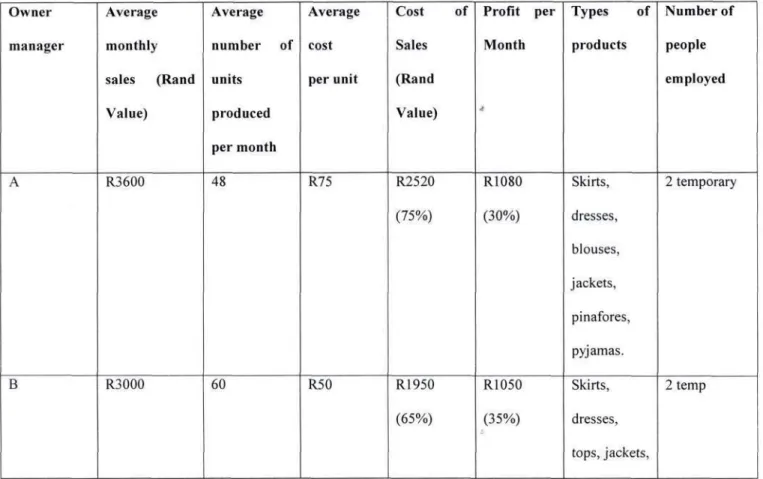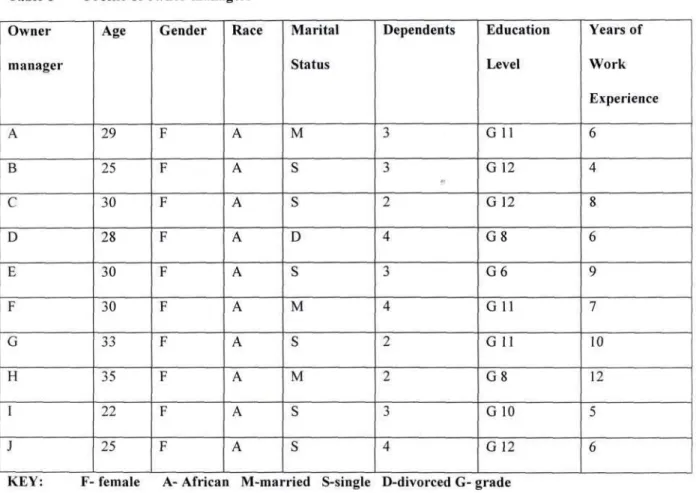Garment production in the informal economy constitutes a major sub-sector and is expanding through a proliferation of survival micro-enterprises. In the 1980s, social scientists argued that the informal sector should take a key position on the national policy agenda.
Problem Statement
Which policies address the needs of the informal sector in KwaZulu-Natal and the Ethekwini Municipality. The main aim of the study is to identify the challenges facing home-based micro-enterprises in the Newlands West area.
THEORETICAL PERSPECTIVES ON THE INFORMAL SECTOR
The informal sector was seen as dependent on the formal sector, a capitalist mode of production, and it could not function independently of the capitalist system (Kekana, 2001). For the first time, the informal sector was hailed as an integral part of the formal urban sector and had an important role to play in its resolution.
Macro-Economic Policy Environment
The government's main strategy to promote small businesses is to distribute supporting services and goods, rather than creating a freer and more supportive environment. The National Small Business Act of 1996 (No. 12 of 1996), which laid the foundation for SMME support, provided bureaucratic structures to deliver support directly to intended recipients. The original structures were the Center for Small Business Promotion (CSBP), the Small Business Council and the Ntsika Enterprise Promotion Agency.
It comprises a number of units responsible for facilitating the development of the SME sector, including: a division for market access and business linkages; a policy research and information unit; an institutional support unit; Analysts say that LBSC and TAC personnel lack experience and business skills that limit the organization's work. There is broad consensus on the delivery record of these bureaucracies supporting enterprises, supported by at least two extensive evaluations and reviews commissioned by the Department of Trade and Industry itself.
The verdict is that there is a shortage of capacity and skills as well as a lack of coordination and synergy between government departments and the new institutions intended to provide services to developing businesses have undermined the latter's ability to deliver. GEM found that SA lags behind other countries when it comes to creating a positive environment for small businesses.
The KZN Provincial Policy Context
The policy takes as its point of departure that local government has a difficult role in supporting economic development, while at the same time pursuing pro-joor policies. According to Cross (2001), knowledge about the informal sector is very limited and the policy measures mentioned above have not been effective at both national and local level. Budlender (1996) suggests that policy on the informal sector should focus on the survival sector where female workers are concentrated.
- Introduction and Background to Case Study
- Research method used in the study General Orientation
- Rationale for choice of methodology
- Sampling
Mouton and Marais (1990) define the differences between quantitative and qualitative research on the basis of the operational specificity of concepts, hypotheses and methods of observation. The purpose of this is to collect information about a problem that is of interest to the researcher. The use of the case study is suitable for this study as it allows the researcher to collect data directly from the owner-managers in their natural environment with the aim of studying their attitudes, views and comments about their micro-enterprise (Leedy, 1993). .
Non-probability sampling is conducted without such knowledge of whether those included in the sample are representative of the population (Denscombe, 2003). The researcher acknowledges that the study is not representative of the population from which it is drawn. However, the researcher is free to deviate from the schedule as long as the material is covered by the conclusion of the interview.
In this way the researcher looks for dominant common themes that appear in the data transcripts. The categories begin to indicate themes that can be used in the inquiry discussion (Denscombe, 2003; Leedy, 1993).
PROFILE OF OWNER MANAGERS
Of the 10 owner-managers, seven were single parents, two were married and one was divorced. It is significant to note that 8 informants were single parents, thus placing a heavy burden on them to run a business and household from the proceeds of the enterprise. It also served as motivation for them to start their own dress-making micro-enterprise.
Seven owner-managers gained experience cutting and sewing clothes while working in garment factories, the other three gained their work experience working for seamstresses. Some of the owners' managers had taken sewing classes and this helped improve their sewing skills. These owner-managers chose the tailoring business because they all had some experience in making clothes.
They either acquired their tailoring skills by working in garment factories, tailoring classes or with friends and family members. Furthermore, they chose tailoring because they found that the start-up costs were minimal compared to other activities such as hawking, street trading, spaza shops, and so on.
BUSINESS ACTIVITIES AND CHALLENGES OF MICRO-ENTERPRISES IN NEWLANDS WEST
Owner managers took bulk orders from street vendors selling their purchases in the central municipality of Ethekwini. Some owner-managers complained that their overhead costs were too high and that customers were not paying their bills on time. Many of the owner-managers complained that customers had applied for clothing on credit, but they were not paying their bills.
Some of the owner managers found the cost of clothing fabrics and accessories to be expensive. The owner-managers hoped that they could continue their enterprises in the years to come. In terms of machinery, most owner-managers used industrial machinery purchased from closed factories.
Although they saved on rental costs, 8 of the owner-managers complained that working from home was sometimes restrictive and inconvenient. The above are some of the challenges that owner-managers face in their micro-enterprises.

DISCUSSION OF FINDINGS
The following is a discussion of the above findings, recommendations presented and a conclusion to the article. Despite having a grade 10 and 12 qualification, they still face difficulties in finding employment. This is symptomatic of the serious unemployment problem in the country, especially in relation to the African population group.
The problem, however, is that these owner-managers feel that there is no government support to help them. However, one of the main problems with SETAs is that they focus mainly on providing grants and training programs to tax-paying firms for skills in the formal sector that contribute taxes to SETAs. The owner-managers also pointed out that their production capacity was hampered by the poor quality of the machinery.
They could not move beyond the level they were operating at due to the financial constraints they faced. As a result, this hindered their chances of penetrating the formal sector of the economy and becoming viable sources of employment.
Conclusion
From the above discussion, it can be argued that one cannot say with certainty that these home-based micro-enterprises are sustainable. What does emerge, however, is the desire of these owner-managers to receive support because they see that their businesses have the potential to be successful. This in turn can lead to the development of appropriate support programs for the owners and perhaps their employees.
This support can therefore help the owner-managers to improve their business and perhaps also create employment opportunities. This study also supports the view that the informal sector does have potential to provide employment opportunities despite the serious challenges it faces as identified in the study. The development of employment in the informal sector, increasing the professional qualities of those working in the informal sector and improving the efficiency and effectiveness of the informal sector are all matters of urgency for the government.
Perhaps a limitation of the study was the focus on domestic microenterprises in only one area. If we had studied domestic microenterprises in other areas, we might have been able to make comparisons and come to different conclusions.
RECOMMENDATIONS
- Capacity Building
- Enterprise Support
- Skills Development
- Strengthening research capacity
- Micro-Financing
- Mentorship
An incentive scheme to encourage NGOs to become more involved in micro-enterprise development would be a cost-effective way of building enterprise capacity as NGOs have a history of working in this sector. It is recommended that a support base be established at the local level by the Ethekwini Municipality to assist micro-enterprises. One of the clearest messages that emerges from the study is the lack of skills of people running micro-enterprises.
From the study, it appeared that almost no research exists at the local level in this area of study. Consequently, the size and shape of the informal sector, its contribution to the local economy, employer and employee numbers as well as sectoral distribution are unknown. One of the most serious problems limiting microenterprise growth is the inability of owners to access financing.
The Ethekwini Municipality must play a more active role in encouraging commercial banks and government financial institutions, such as the Development Bank of South Africa and Khula, to offer microfinance to informal micro-enterprises. Small Enterprise Development Agency (SEDA) and other agencies should help microenterprises strengthen their capacity.
Case studies of female domestic workers in Durban's shacks and townships, Durban: Durban Metro Council Economic Development Department. Service provision for street-based traders in Pietermaritzburg, KwaZulu-Natal: comparing local findings with lessons learned from Africa and Asia. State of the Union address of President Mbeki of South Africa to the second joint session of the third democratic parliament, 11 February, Cape Town.
Understanding Formal and Informal Economy Labor Market Dynamics: A Conceptual and Statistical Review with Reference to South Africa Research Report No. From Lewis to Dollar and Kraay and Beyond: A Review and Stocktaking of Fifty Years of Poverty, Inequality, and Economic Growth. Finance and Development Study Group Meeting on "50 Years of Development Economics: Taking Stock of Controversies", Overseas Development Institute, London.
APPENDICES Appendix A
Appendix B
In response to this, the researcher undertook to maintain the confidentiality of my identity at all times.
Appendix C
Consent
Quote certain parts of my interview
Interpret such parts in the light of the research project; and
Acknowledge information supplied by myself during the course of the interview
